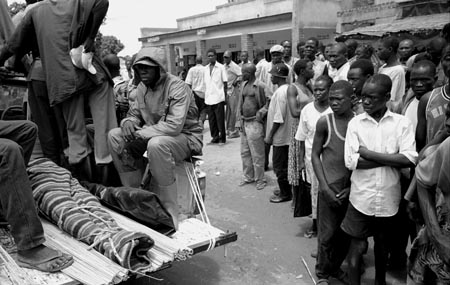


| November 9, 2005 |
| Justice and Peace in Uganda By Eric Stover and Marieke Wierda |
|
Editor's Note: On October 14 the International Criminal Court in The Hague unsealed its first set of indictments, directed against five leaders of the Lord's Resistance Army. The role of the International Criminal Court in Uganda -- where the LRA has carried out its worst attacks -- is controversial, with some people claiming that it will make a peace settlement more difficult. The interplay of justice and peace is discussed in this article co-written by one of the Crimes of War Project's directors. The first indictments ever issued by the International Criminal Court should be seen as a victory for advocates of justice everywhere. The indictees are leaders of the Lord's Resistance Army, a spiritualist rebel group with no clear political agenda that has waged a vicious war against the people of northern Uganda for nearly two decades. To fortify their ranks, LRA commanders have abducted thousands of children and adults to serve as porters and soldiers. They have forced girls, some as young as 12 years old, into what amounts to sexual slavery, and have inflicted horrific injuries by cutting off the ears, noses, lips and limbs of defenseless civilians. Of the 2,585 people we recently interviewed in four districts in northern Uganda for our study, "Forgotten Voices," 31 percent told us they had had a child who was abducted, 23 percent said their children had been mutilated and 45 percent said they had witnessed the killing of a family member. |
|
Ugandan soldiers return the body of a man who was one of three villagers abducted and killed by Lord's Resistance Army rebels while they tried to protect their village from an attack. Gulu, northern Uganda 2005 © T.Morley/ Exile Images |
What better candidates for indictment could there be than those who organize and order such heinous crimes? Proponents of the International Criminal Court argue that this is exactly what it was created for and that even its critics, like the Bush administration, which has declared the LRA a terrorist organization, could hardly object. But the situation is not that simple. Nineteen years of war have turned northern Uganda into a humanitarian catastrophe. Over 1.6 million people now languish in hundreds of squalid camps and shelters where they are dependent on handouts from the UN World Food Program to survive. Clean water and medical care are scarce. Malnutrition and such diseases as malaria, scabies and tuberculosis are rampant. Most camp residents live in fear and despair and simply want the war to end.
Opponents of ICC intervention in northern Uganda argue that the indictments, especially of the LRA leader Joseph Kony, will prompt the rebels to abandon peace talks and go on a killing spree, and perhaps trigger the resignation of the government's highly respected chief peace negotiator, Betty Bigombe. As signatories of the ICC statute, Britain, the Netherlands and Norway would have to end their financial and logistical support of Bigombe's efforts and redirect attention and resources to the enforcement of the arrest warrants. To make matters worse, ICC opponents argue, the Ugandan government's amnesty program, which has granted clemency to over 6,000 LRA combatants, will be in jeopardy. Some would say that too many concessions have been made to top LRA leaders who have benefited handsomely from the amnesty and that such preferential treatment has shifted the emphasis too far away from the imperatives of justice and accountability. While many LRA returnees face a life of economic deprivation and social stigmatization, former commanders, including Sam Kolo and Kenneth Banya, have been hosted by the government and placed at the helm of controversial and exploitative reintegration projects for former rebels. Sidelined in the peace-versus-justice debate have been a vast majority of ordinary northern Ugandans, who have rarely been given the opportunity to speak for themselves. Most northern Ugandans do not see peace and justice as mutually exclusive, our recent survey suggests. Three-quarters said that those responsible for abuses should be held accountable. When asked what should happen to the leaders of the LRA, 66 percent were in favor of punishing them, while 25 percent suggested such measures as confessions to the community and compensation to victims. The chief prosecutor at the Nuremberg trials, Judge Robert Jackson, once remarked: "Courts try cases - but cases also try courts." The ICC's first case will effectively place the court - and by extension, the international community - on trial. To avoid a potential catastrophe and to ensure that justice is done, governments must immediately follow suit and step into the breach to forge an integrated and comprehensive strategy for peace and justice in northern Uganda. Indicted LRA leaders must be captured and brought before the court. Financial and logistical support must be provided to northern Uganda's criminal justice system so that it can try those responsible for terrible crimes not covered by the ICC indictments. More incentives must be offered to entice rank-and-file LRA rebels to lay down their arms and ensure that they are able to reintegrate fully into society. And concrete measures must be taken to alleviate the acute suffering of victims and to provide them with redress. For if we fail in this first experiment in international criminal justice, it will not only be a betrayal to the people of northern Uganda but may also cripple efforts to end impunity for crimes against humanity in other war-torn countries. Eric Stover is director of the Human Rights Center at the University of California, Berkeley, and a director of the Crimes of War Project. Marieke Wierda is senior associate at the International Center for Transitional Justice. This article was first published in the International Herald Tribune on October 14. © 2005 IHT/iht.com.
Related Chapters from Crimes of War: What the Public Should Know: Related Links:
|
This site © Crimes of War Project 1999-2004 |
|
